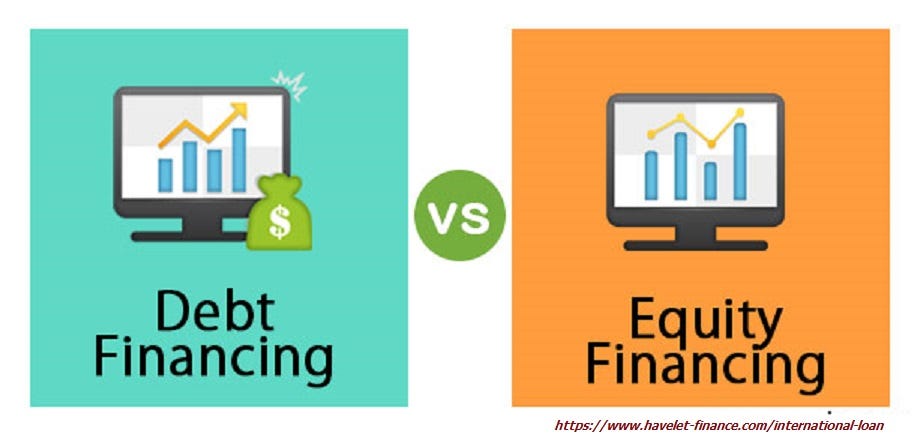Debt Financing and Equity Financing; A comprehensive Overview.
Debt Financing and Equity Financing; A comprehensive Overview.
Considering the two main types of financing available for companies: debt financing and equity financing. Debt financing is a loan that must be paid back often with interest, but it is typically cheaper than raising capital because of tax deduction considerations. Equity Financing does not need to be paid back, but it relinquishes ownership stakes to the shareholder. Both debt and equity have their advantages and disadvantages. Most companies use a combination of both to finance operations.

Types of Financing
Equity Financing
“Equity” is another word for ownership in a company. For example, the owner of a grocery store chain needs to grow operations. Instead of debt, the owner would like to sell a 10% stake in the company for $100,000, valuing the firm at $1 million. Companies like to sell equity because the investor bears all the risk; if the business fails, the investor gets nothing.
At the same time, giving up equity is giving up some control. Equity investors want to have a say in how the company is operated, especially in difficult times, and are often entitled to votes based on the number of shares held. So, in exchange for ownership, an investor gives his money to a company and receives some claim on future earnings.
Some investors are happy with growth in the form of share price appreciation; they want the share price to go up. Other investors are looking for principal protection and income in the form of regular dividends.
Merits of Equity Financing
Securing a business funding through investors has several Merits, including the following:
- The biggest advantage is that you do not have to pay back the money. If your business enters bankruptcy, your investor or investors are not creditors. They are part-owners in your company, and because of that, their money is lost along with your company.
- You do not have to make monthly payments, so there is often more cash on hand for operating expenses.
- Investors understand that it takes time to build a business. You will get the money you need without the pressure of having to see your product or business thriving within a short amount of time.
Demerits of Equity Financing
There are countless demerits that is associated with equity financing, including the following:
- How do you feel about having a new partner? When you raise equity financing, it involves giving up ownership of a portion of your company. The riskier the investment, the more of a stake the investor will want. You might have to give up 50% or more of your company, and unless you later construct a deal to buy the investor’s stake, that partner will take 50% of your profits indefinitely.
- You will also have to consult with your investors before making decisions. Your company is no longer solely yours, and if the investor has more than 50% of your company, you have a boss to whom you have to answer.
Debt Financing
The famous nature of debt financing is at increase. Debt as a form of financing is associated with car loans or mortgages. Debt is also a common form of financing for new businesses. Debt financing must be repaid, and lenders want to be paid a rate of interest in exchange for the use of their money.
Some lenders require collateral. For example, assume the owner of the grocery store also decides that they need a new truck and must take out a loan for $40,000. The truck can serve as collateral against the loan, and the grocery store owner agrees to pay 8% interest to the lender until the loan is paid off in five years.
Debt is easier to obtain for small amounts of cash needed for specific assets, especially if the asset can be used as collateral. While debt must be paid back even in difficult times, the company retains ownership and control over business operations.
Advantages of Debt Financing
There are several advantages to financing your business through debt:
- The lending institution has no control over how you run your company, and it has no ownership.
- Once you pay back the loan, your relationship with the lender ends. That is especially important as your business becomes more valuable.
- The interest you pay on debt financing is tax deductible as a business expense.1
- The monthly payment, as well as the breakdown of the payments, is a known expense that can be accurately included in your forecasting models.
Disadvantages of Debt Financing
Debt financing for your business does come with some downsides:
- Adding a debt payment to your monthly expenses assumes that you will always have the capital inflow to meet all business expenses, including the debt payment. For small or early-stage companies, that is often far from certain.
- Small business lending can be slowed substantially during recessions. In tougher times for the economy, it’s more difficult to receive debt financing unless you are overwhelmingly qualified.
As explained above, the both financing are good for companies who needs funding. That being said, Havelet Finance Limited is Ready, Willing and able to provide funding to any extent. To enquire more on how to secure funding, kindly make your contact below;
Email: credit@havelet-finance.com
https://www.havelet-finance.com/international-loan
Comments
Post a Comment